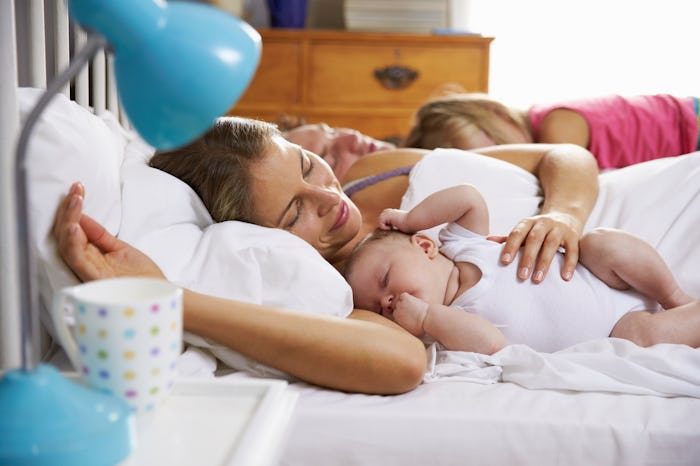Life

How Bed-Sharing Affects Your Partner
There are so many sleeping arrangements to choose from when you have kids. No one sleeping plan is going to work for everyone, and it might take some trial and error to find what works best for you and your family. Opening up your bed to your infant, or even older child, will undoubtedly be an adjustment for you, but it will also be one for your partner. So how does bed-sharing affect your partner?
First, it's important to clarify what bed-sharing is. As explained on the Kids Health website, bed-sharing is bringing an infant or child into the family bed . Advocates of this sleeping arrangement claim it aids in breastfeeding, gets a mother's sleep schedule in sync with the baby's sleep patterns, and helps with mother-baby bonding. Bed-sharing is highly controversial right now because of the perceived deaths that possibly occur when families or caregivers practice it in an unsafe manner. Examples of unsafe bed sharing environments include: caregiver using drugs are alcohol, pillows or blankets near the baby, or a caregiver sharing a sleeping space with an infant on a couch, as explained on the same site. The American Association of Pediatrics advised against bed sharing, and cites the controversial sleeping arrangement as a risk factor for Sudden Infant Death Syndrome (SIDS) in infants. The same site noted that room sharing, however, can reduce the risk of SIDS by 50 percent.
Whether you room share or bed-share, you and your partner's sleep will probably be impacted in many of the same ways. The only real difference will be how your body responds to bed sharing versus the way your partner's body handles it. For starters, you can both expect to have more disturbed sleep more often. According to Baby Center, sleep expert James McKenna claimed that in laboratory studies, on average babies who bed share may "arouse" briefly more often than babies who sleep alone in another room. (It's worth noting, however, that the studies also showed that once awake, the babies who shared a bed fell back asleep faster than solitary sleeping babies.) How light or heavy your partner sleeps will determine how much these sleep disturbances will impact them.
For example, I'm an incredibly light sleeper and find it difficult to go back to sleep when I get woken up. My new mom years were painful for that reason alone. It would sometimes take me two hours to fall back asleep even after my babies drank their bottles and drifted off back to sleep. My husband, on the other hand, barely heard a thing. He hardly ever woke up when the baby was crying in our room. He only woke up when I nudged him to take a turn, and then I would jealously watch as he went right back to sleep after feeding the baby. In the end, room sharing did not work for us because my mood and daily functions started to be severely impacted by lack of sleep.
When you're navigating different sleeping arrangements within your family, trying them out is the only way if you'll know for sure what works best. The biggest thing to keep in mind is that no matter how you bed-share, co-sleep, breastsleep, whatever the name of your slumber plan is, doing it safely is the key to a good night's sleep for everyone involved.